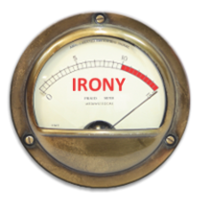Irony Meter explodes/projection/femvertising/*sigh*

There’s a psychological phenomenon called projection. According to Wikipedia it’s a theory in which humans defend themselves against their own unconscious impulses or qualities (both positive and negative) by denying their existence in themselves while attributing them to others. For example, a person who is habitually intolerant may constantly accuse other people of being intolerant.
And if you were, say, endemically sexist (and racist) and treated women much worse than the men in your organisation, you might build a statue to the empowerment of women. Unfortunately, the news might then come out that you were ironically sexist champions of feminism, making you look like right dodgy bastards, but by then you’ll have picked up a ton of positive publicity and awards, so no matter, eh?
I’m delighted about this revelation. Not because of schadenfreude or a hatred of advertising, but because I hope it slams a nice juicy nail into the coffin of these immensely tedious and misguided corporate social movements.
I’m going to go out on a limb and say that I don’t think a single one of them is primarily motivated by a real desire to right a societal wrong. Nope – they 1000% would not exist were it not for the fact that they help big companies seem much nicer than they really are, while simultaneously giving ad agencies a chance to look all virtuous, make some money and win lots of awards. I imagine that among most of the practitioners there’s also a large element of either guilt-alleviation or projection.
Allow me to make my case with the biggest femvertisers on the planet:
The underlying bollocks of Fearless Girl has been covered with chef-finger-kiss deliciousness in the above article, but what about Dove Beauty Sketches? We already have 100% projection from Unilever as they attempted to deflect years of Lynx sexism by pretending to give a toss about the problems of female body image that they helped to create. But what else? Well, what about the fact that they provide us with a ridiculously judgemental assessment of what female beauty is?
They say ‘The problem is, we’re so bombarded by unattainable standards of beauty – in magazines, TV, advertisements, on social media – that we undervalue the true beauty in ourselves’ (that massive bang you heard was another irony meter explosion). But also: ‘The (picture) based on the stranger’s portrayal was more beautiful.’ That means they showed millions of people these pictures and judged the ones on the left to be less ‘beautiful’ than those on the right:



And that’s from a company that says ‘Our body image takes such a battering that feeling beautiful can be hard’. Yeah, partly because you just showed millions of women that looking like the images on the left is somehow worse than looking like the ones on the right. But says who? If you were really trying to empower women to see the ‘real beauty’ in themselves would you present an image of one woman as less physically beautiful than another? Well, yes – if you had no real interest in such empowerment and instead were trying to sell a load of soap by looking nicer than you actually are.
And what about the third giant, Like a Girl?
Watch it again. Do you seriously think that this is a properly worked out scientific experiment? Does it have a control? Did we see any of the people who, when asked, didn’t throw/run/fight in that silly way that Always presented? How many were asked? Where did they get the participants from? How were the participants prompted in their answers? Did they give different answers before being nudged in this direction? Exactly how big a plate of bullshit are they serving us?
Always then makes the assertion that a girl’s confidence plummets during puberty, suggesting that this happens from 10-12 years old, as if there’s something magic that happens at that point where the rest of us terrible bastards start using the phrase ‘like a girl’ as a pejorative, as if that doesn’t happen to eight-year-olds. And that is based on what, exactly?
According to one interviewee, at that time girls are “already trying to figure themselves out. And when somebody says ‘you hit like a girl’ it’s like ‘Well, what does that mean?’. ‘Cause they think they’re a strong person, it’s like telling them they’re weak and they’re not as good as them.” What a delightfully inarticulate load of baseless conjecture presented as a cogent and substantiated statement that we’re supposed to take seriously (and, sadly, many millions seemed to). When you offer a straw man and knock it down with bullshit you’re not doing anyone any favours; you’re patronising the very people you’re pretending to be on the side of.
What about projection? Has Always ever made a commercial that suggested periods were something to be ashamed of? 10 seconds of searching on Youtube presents us with this poor girl who has to ‘tie a jacket around my waist’ when the wings of her pantyliner let her down:
https://www.youtube.com/watch?v=1KSf3oBBX0o
Unlike Always, I won’t pretend my research is complete or scientific, but just calling these things ‘sanitary’ towels implies that they’re dealing with something unsanitary. Imagine that – you get to puberty, you get a period and you’re told that it’s an unclean thing that needs a ‘sanitary’ solution. Empowering? Doesn’t sound like it. Over the years Always has helped to perpetuate the perception of periods as negative occurrences (to which they can provide the solution), so now they feel bad about it (not really) and have created this ad to make everyone aware. I think we know the psychological term for that.
Perhaps someone can refute my assertion that these projects are nothing more than cynical marketing exercises dressed up as somewhat charitable endeavours, offsetting shitty behaviour and, for the agencies, making money and providing award-friendly Cannes entries. Whatever they are, they are certainly not rigorous scientific experiments whose results mean anything more than a bit of wank tossed off in the office of a pair of award-hungry creatives. But by masquerading as something more substantial they assist in the process of greenwashing the companies behind them, and that does real damage.
To be clear: there’s absolutely nothing wrong with experiments that attempt to redress the imbalance that years of sexism have created, but make them real, genuine and on behalf of organisations or companies that truly want to empower a downtrodden demographic. Silly bollocks designed to make very rich companies even richer will only get in the way of more credible efforts, and when we find out (as in the case of Fearless Girl) that we’ve all been taken for a ride, the likelihood of us paying attention to the company that does some actual good declines.
I’ll leave you with one of the daftest examples of femvertising I’ve ever seen (8.7m views), and the fervent hope that these school projects pretending to be Phd dissertations will either improve or die:
https://www.youtube.com/watch?v=7DdM-4siaQw
Update: Dove’s most recent clotheared attempt at empowering ‘real women’ appears to be a touch racist.
IMHO this was always the best of those type of ads – https://www.youtube.com/watch?v=AQ_XSHpIbZE
Those are great, and make sense for the client.
The articles you linked to raise an interesting point.
Surely the most impactful thing brands can do is to ensure that pay is equal across the board.
I wonder if Dove or Unilever have equal pay? If it ever came out that that pay wasn’t equal then all their femvertising counts for nothing.
There is so much of that ‘talk the talk, don’t walk the walk’ going on.
And look at the ‘leadership’ group of any sizable organisation: I guarantee it’ll be predominately white men.
Fearless woman now allowed to drive taxi in my country. It because twat in agency make too many film about sad woman and seagulls shitting out suncream.
Agree with you Ben – I particularly dislike how Dove is often cited by my students as “empowering”. Yet the VO tell us “beautiful affects the jobs we get, the friends we make and how we care for our children ” FFS. You only have to watch the parody with men in it to see the ridiculousness.
Beauty nor beautiful – damn phone
“One of the great mistakes is to judge policies and programmes by their intentions rather than their results.” ~ Milton Friedman
A fine point, but you have to then consider all the results: the YouTube views and sales, but also the people who have been impacted negatively and the effect on the ad industry etc.
Dove empowering women of all shapes, sizes and ethnicities just went right out of the window with their latest offering showing a black woman turning white using their soap. Isn’t it ironic as Alanis Morrisette once sang. https://www.theguardian.com/world/2017/oct/08/dove-apologises-for-ad-showing-black-woman-turning-into-white-one
That would be awful if that’s what actually happened in the ad.
The guardian is full of shit.
Hey Ben
Do you listen to Russell Brand’s Under The Skin podcast?
If not, do – he has some great guests and they cover some fascinating topics which I think would be right up your street.
The Naomi Klein podcast is excellent and covers some similar themes to your post – she has some quite surprising views on brands and causes.
https://www.russellbrand.com/podcast/ep-18-naomi-klein-why-we-must-kill-our-inner-trump/
Cheers
Ant
Thanks, Ant.
I do listen to Under the Skin, and in fact met Russell last week when he was promoting his new book. I asked him to interview the people behind the B Corp movement. Worth looking up.
Nice one Ben. I just checked out the BCorp movement. Very interesting…I wonder if behemoths like P&G, Unilever etc could ever get to the point where they could become a certified B Corp…
Unilever is apparently giving it a go but the B Corp guys are having to reassess their criteria to work out what new parameters need to apply to such large organisations.
One of podcast interviewees is the guy who started B Corps. Check it out:
https://soundcloud.com/user-882245585/itiaptwc-episode-42-jay-coen-gilbert
Ah, I missed that one, I’ll have a listen. Cheers.
By the way, did you read the Russell Brand book? If so, is it any good?
It is good, but I think the more of an addict you are, the more useful you’ll find it.
I don’t really have any issues in that direction so I read it more as a curiosity than a self-help manual.